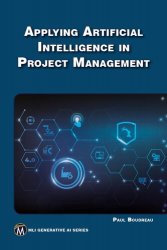Applying Artificial Intelligence In Project Management
- Добавил: literator
- Дата: 13-10-2024, 12:53
- Комментариев: 0
 Название: Applying Artificial Intelligence In Project Management
Название: Applying Artificial Intelligence In Project ManagementАвтор: Paul Boudreau
Издательство: Mercury Learning and Information
Год: 2024
Страниц: 233
Язык: английский
Формат: pdf, epub (true)
Размер: 10.1 MB
This book describes the Artificial Intelligence (AI) tools in concept and how they apply directly to project success. It also demonstrates the strategy and methods used to purchase and implement AI tools for project management. You will understand the difference between automating a task and changing it by using AI. Discover how AI uses data and the importance of data maintenance. Learn why projects fail and how using Artificial Intelligence for project management improves project success rates. The book features project management success stories and demonstrates how to leave behind that low project success rate for one that is 95 percent or higher. Supplemental teaching materials are available for use as a textbook.
Prediction software consists of three components: the input data, software containing the Machine Learning algorithm, and output. The input data typically consists of several characteristics based on historical projects completed by an organization or within an industry. Each project is labeled as “successful” or “not successful.” Success can be user-defined for an organization. For example, the definition can be delivering the project scope no more than five percent over budget or five percent late to the scheduled end date. The definition is flexible as long as it is consistently applied to each project in the dataset. The definition assumes that the quality requirements are defined in the scope document and that risk factors affect the budget or schedule. Since the projects have labeled datasets, the algorithm is trained using a supervised learning model. Alternative algorithm functions, such as support vector machines (SVMs) and random forest classifiers are possible, but a neural network produces the most consistent and accurate results. A typical output of a neural network used for project prediction is the probability of project success. The Machine Learning software correlates features in the datasets into a model that represents an image of success for a project. Unlike a traditional project methodology that postulates that every process must be included to be successful, the Machine Learning algorithm decides what pattern of features contributes the most to achieving the label. The output is a prediction of probability that is too complex for a project manager to determine from looking at the data.
The first step in developing the software was to train the algorithm to create a model based on the labels of project success or failure. The historical datasets were uploaded, and the training process began. The algorithm performed validation to ensure the data fields contained structured data. Once the model was created, a set of test data with known results was used to verify that the model accurately represented the labels. The input data was stored in a spreadsheet, but it could have also been stored in a database. The software program was written in Python. The software was hosted in the cloud and used Heroku as an interface for a Web browser. Creating the code for a neural network was fairly straightforward with modern programming utilities.
Features:
Covers a practical approach to using AI in project management
Features a chapter on combining AI with other technologies such as IoT, Blockchain, and virtual reality for further insights into leading-edge changes for project management
Demonstrates how to achieve higher productivity and incredible project performance by applying AI concepts
Includes supplemental teaching materials for use as a textbook
Table of contents:
1. Why Project Management Needs AI. 2: Two AI Components for Projects. 3: The Business Case for AI. 4: Automating Project Management Tasks. 5: Providing Good Project Data. 6: Acquiring and Using Data. 7: Predicting Project Results Using Machine Learning Algorithms and Supervised Learning to Predict Results. 8: Improving Project Productivity With NLP. 9: Generative AI and Large Language Models. 10: Genetic Algorithms for Project Navigation. 11: Project Initiation, Planning, Delivery, and Close. 12: Project Control and Project Termination. 13: AI for Agile Process Effectiveness.
14: Applying AI to Resolve Project Failure. 15: The Build or Buy Decision. 16: Evaluating and Acquiring AI Software.
17: Implementing AI Solutions. 18: Changes to Roles of the Project Manager, PMO, and Project Team. 19: Ethical Implications of AI in Project Management. 20: The Rapid Advance of AI Technology. 21: Conclusion. Appendix. Index.
Скачать Applying Artificial Intelligence In Project Management
Внимание
Уважаемый посетитель, Вы зашли на сайт как незарегистрированный пользователь.
Мы рекомендуем Вам зарегистрироваться либо войти на сайт под своим именем.
Уважаемый посетитель, Вы зашли на сайт как незарегистрированный пользователь.
Мы рекомендуем Вам зарегистрироваться либо войти на сайт под своим именем.
Информация
Посетители, находящиеся в группе Гости, не могут оставлять комментарии к данной публикации.
Посетители, находящиеся в группе Гости, не могут оставлять комментарии к данной публикации.
